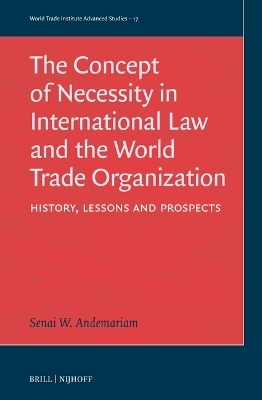
The Concept of Necessity in International Law and the World Trade Organization
Martinus Nijhoff (Verlag)
978-90-04-69999-1 (ISBN)
Like many concepts in international law, the definition of “necessity” varies widely depending on context. The concepts of necessity in different fields of international law can maintain their unique definitions while learning from each other, and thereby achieve coherence. This book presents the evolution of the concept of necessity, and discusses its definitions in nine different fields of international law. Centering customary international law and the law of the World Trade Organization in his analysis, Dr. Senai W. Andemariam examines the potential for interactions and coherence between concepts of necessity in various fields of international law.
Senai W. Andemariam, Ph.D., Maastricht University, is a former judge and now the head of the Department of Law of the College of Business and Social Sciences in Eritrea. He received his LL.B. from the University of Asmara (With Distinction) and his LL.M. from Georgetown University (With Distinction) as a Fulbright Scholar. He has published with journals at Cambridge University Press, Oxford University Press, Taylor and Francis, Routledge, Springer, DeGruyter, Brill and others.
Foreword
Acknowledgments
List of Tables
Acronyms
Introduction
Part 1
History of the Concept of Necessity in Law
1 Evolution of the Concept from the 1st Millennium bc to the 20th Century
1.1 Early Period
1.2 Medieval Period (5th to 15th Centuries)
1.3 The Westphalian Concept of Necessity and the Aftermath (17th to 20th Centuries)
2 State and Tribunal Practices until the 1930s
2.1 State Practices
2.2 Tribunal Practices
2.3 Avoiding the Conflation
2.4 Lessons Learned from the State and Tribunal Practices
3 Placing Necessity in the Context of the Relationship between Sovereignty and Treaty Law
3.1 How the Exercise of Powers of Necessity Evolved since the Peace of Westphalia
3.2 Consent as the Binding Element in the Sovereignty-Treaty Obligation Interface
3.3 Lessons from the History, Practices and Presentation of Necessity since the 1st Millennium bc
Part 2
The Concept of Necessity in International Law
4 Preliminary Issues
4.1 Necessity: A Widely Represented Concept in International Law
4.2 Issues on the Concept of Necessity in International Law
5 The Concept of Necessity in Different Fields of International Law
5.1 The Law of Use of Force
5.2 International Humanitarian Law
5.3 International Environmental Law
5.4 The Law State Responsibility as Codified in the arsiwa
5.5 International Investment Law
5.6 International Human Rights Law
5.7 International Criminal Law
5.8 The Law of Responsibility of International Organizations as Codified in the dario
5.9 Lessons Learned from the Experiences with the Concepts of Necessity in Different Fields of International Law
6 The Role of International Courts and Tribunals in Developing the Concept of Necessity in Customary International Law
6.1 General Notes
6.2 The pca
6.3 The pcij
6.4 The icj
6.5 The itlos
6.6 Other International Tribunals
6.7 Lessons Learned from the Contributions of Various International Courts/Tribunals on the Development of the Concept of Necessity in International Law
Part 3
The Concept of Necessity in wto Law
7 History of the Drafting of the Necessity Defense Provisions in the General and Security Exceptions of the gatt 1994/gats
7.1 Pre-gatt 1947 Trade Agreements and Treaties Containing General Exceptions-Like Provisions
7.2 The US-UK Discussions for Post-Second World War International Trade Rules
7.3 The Drafting of the General and Security Exceptions in the London-New York-Geneva-Havana Meetings (1946–1948)
8 Evolution of the Interpretation of the Concept of Necessity in the General and Security Exceptions of the gatt (1947 and 1994) and the gats
8.1 General Observations on the Nature and Practice of the General Exceptions
8.2 Interpreting the Term ‘Necessary’ in the General Exceptions
8.3 The Concept of Necessity in the Security Exceptions
9 The Concept of Necessity in Other wto Agreements, the tbt, sps and trips Agreements in Particular
9.1 Textual Presence of the Term (Concept of) Necessity
9.2 General Background on the tbt and the sps Agreements
9.3 The Concepts of Necessity in the tbt and the sps Agreements
9.4 Comparing the Interpretations of Necessity in the General Exceptions of the gatt 1994/gats, the tbt Agreement and the sps Agreement
9.5 Necessity under the trips Agreement
9.6 Has a ‘wto Law Concept of Necessity’ Emerged?
Part 4
The Interaction between the Concepts of Necessity in Customary International Law and wto Law
10 The Interface between Customary International Law and wto Law
10.1 Contextualizing the Relationship
10.2 wto Law in the Universe of International Law
10.3 The Two-Way Relationship between wto law and International Law
11 Rules on Interfacing the Concepts of Necessity in wto Law and Other Fields of International law
11.1 Rules and Practices of Interoperability
11.2 Interoperability in the Context of the Current Crisis of the wto Dispute Settlement System
11.3 Contrasting the Concepts of Necessity in wto Law and cil
12 The Exercise of Interfacing the Concepts of Necessity in wto Law and cil
12.1 Grounds for Considering Interoperability
12.2 Potential Interoperability
Conclusion and Final Remarks
Bibliography
Index
| Erscheinungsdatum | 04.06.2024 |
|---|---|
| Reihe/Serie | World Trade Institute Advanced Studies ; 17 |
| Sprache | englisch |
| Maße | 155 x 235 mm |
| Gewicht | 959 g |
| Themenwelt | Recht / Steuern ► EU / Internationales Recht |
| Recht / Steuern ► Öffentliches Recht ► Völkerrecht | |
| ISBN-10 | 90-04-69999-6 / 9004699996 |
| ISBN-13 | 978-90-04-69999-1 / 9789004699991 |
| Zustand | Neuware |
| Haben Sie eine Frage zum Produkt? |
aus dem Bereich


